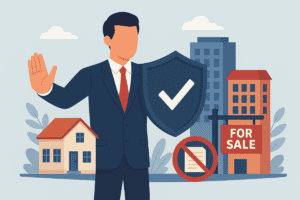Why do some people lose their savings in bad property deals, while some make money initially? Real estate is a good investment. But protecting oneself is the key to profit. The wrong move here may result in legal complications, financial losses, or property loss. This is why staying alert right from the beginning is vital. This guide will walk you through smart ways to safeguard yourself while navigating the real estate world with confidence.
Know the Real Estate Market Before Jumping In
Before jumping into property buy-sell, take your time to understand the local market. Prices, demands, locations, and trends all vary widely. Understanding what property is priced in the area helps you avoid overpriced deals. You should also know what sort of property is being demanded. This will save you from investing in weak assets. Real estate agents and online platforms might give a fair amount of idea of the market. But it’s better not to rely on one source alone. By all means, double-check.
Choose a Trusted and Licensed Real Estate Agent
A trusted real estate agent makes a difference. They are knowledgeable about the laws, paperwork, and procedures. But not all agents are honest. Choose someone licensed and with a great number of favourable reviews. Ask for references and speak to the agent’s previous clients. A good agent should explain everything and never make you feel rushed to make decisions.
Verify Property Ownership Through a Land Title Search
Never skip this. Confirming property ownership is crucial since a flimsy or fake title is one of the biggest reasons for real estate fraud. A proper land title search should be done first to dispel any doubts. This search reveals the legal owner of the said land and whether any loans or disputes are against it. Consider checking out a land title search for your state through the local land records office or online. Validate that the title is clean and under the seller’s name. If the title is in dispute, refrain from entering into the deal.
Examine All Property Documents Thoroughly
Every property has various documents. These are the sale deed, ownership history, tax receipt, and building approvals. Read through each one thoroughly. This leads to great trouble later on. Always check the previous ownership records of the property. Ensure that there are no pending dues or loans. If you find anything suspicious, ask the seller to clear it before moving forward.
Understand Zoning Laws and Location Legality
Every property has a zone: residential, commercial, industrial, or agricultural. So, make the necessary checks regarding zoning before making a purchase. There is not much scope for building it according to what was desired if one bought residential land in a commercial zone. It may be well validated with local authorities on whether the building plan is approved. Also, verify that the property is not located on illegal layouts or government land. This is what most buyers ignore and will eventually face demolition. The location should be legally approved, safe, and convenient for your use.
Avoid “Too Good to Be True” Offers
If it sounds too good to be true, it probably is. Watch out for properties that are auctioned away at a much lower cost than the market rate. Often, owners do this to hide legal or ownership issues. Some houses in such offers could have issues with their land title, illegal structures, or even tax clearance. It is always better to miss out on a cheap deal rather than be caught up in lengthy court cases. Trust your instinct and take your time. Do not be pushed into fast decision-making.
Never Skip Property Registration
Property registration legally transfers ownership from the seller to the buyer. If a property is not registered, technically, it is not yours. Even if one has paid money to acquire it, one cannot officially own it. Many have lost their houses just because they believed in verbally promising or dealing with informal transaction issues. As soon as you close the deal, pay a visit to the sub registrar’s office and complete your registration process. Pay the stamp duty necessary and get the registered deed in your name. This is the protection that gives ownership of life and avoids future problems.
Conclusion
Real estate can be a profitable and rewarding venture, but it demands vigilance and knowledge. Protecting yourself begins with understanding the market, checking documents, verifying legal status, and following proper procedures. Never rush into a deal or trust vague promises. When in doubt, consult a legal expert or property advisor. With the right steps, you can avoid costly mistakes and make smart real estate decisions that pay off in the long run.

